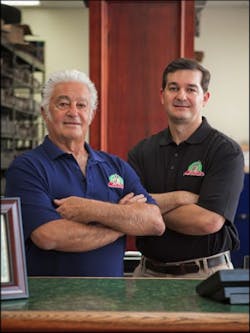Giving up the keys to his 40-year-old business has been hard for John Modesti, owner of Modesti’s Car Care Center in Culver City, Calif.
The potential pitfalls of passing the business on to son Nick Modesti—even after working alongside him for more than two decades—weighed heavy on John’s mind for years.
“The greatest fear I had was giving Nick the business, walking away from it, and watching it fail,” John says. “We still owe money on the building. There’d be no way for me to pay for it if the business failed.”
It wasn’t until a few years ago that those fears started to subside. That’s when John and Nick got serious about developing a succession plan and mapping out the transition, which is nearing completion. For a father and son who weren’t always on the same page when it came to the future of the business, the journey has required some real soul searching, along with intense training—for both of them—and the all-important development of trust.
control to do what they need to do.”
—John Modesti, owner, Modesti’s Auto Care Center
Both John and Nick offered their perspectives on the delicate and often emotional transfer of a family-run repair facility.
Letting Go
Since launching his business back in 1972 as a tiny one-man operation, John, 68, has never had any aspirations of keeping the business in the family. But family has always been a big part of the business—his sister managed the shop for 20 years, his brother-in-law has worked on and off as a mechanic for just as long, and Nick started sweeping floors at the shop as a teenager in the mid-1980s.
Nick, now 43, has spent most of his life working at the shop as a helper, mechanic, parts manager, service advisor and ultimately general manager. He’s helped the business grow into the 11-employee, $1.3 million operation it is today, but he didn’t express any interest in taking over the shop until a few years ago, after returning to the business following a stint as an insurance agent. At that point, John was working on an exit strategy and thought he’d be selling the business to someone outside the family.
He says he heard horror stories of father-son business transitions gone wrong, and he didn’t want to give the business to his son if Nick’s heart wasn’t in it. John had worked hard to build the shop and wasn’t willing to watch it sink, as had happened to a friend of his.
“He gave his son a shop and his son failed,” John says. “And after being out of it a couple of years, (the friend) had to come back into it only to find someone to buy it. And that was his final exit.”
But after Nick explained to his dad that he was committed to taking over the business, John decided to get the transition started. He had just one stipulation: He and his son had to complete a series of training courses on best management practices, so they could get on the same page as to how the business should be run.
It’s an earned position. It’s not something that you’re just given, nor should it be.”
—Nick Modesti, General Manager, Modesti’s Auto Care Center
It’s not that they didn’t agree on most things; they actually had similar work ethics, values and management philosophies. But at the time, the business had gone through a couple of unprofitable years. John thought his fears of failure would be quickly realized unless he and Nick figured out how they could improve.
So, over the course of several years, Nick and John participated in a variety of courses offered through organizations such as Turnaround Tour. And, after a suggestion from Nick, they joined a network of shops through the WORLDPAC Training Institute, so they could share and compare performance data. Gradually, the Modestis started growing the business again, thanks to some basic lessons, such as budgeting for profit.
“That really hit a spark with Nick and myself because I ran the business without a budget and some years unprofitably,” John says.
As profit margins grew—today they range from 10 percent to 16 percent—John started to back out of the shop and let Nick move into the leadership role. John is planning to make the ownership transition official within the next two years. The only reason it hasn’t happened yet, John says, is to keep the burden of legal liabilities off of Nick’s shoulders.
“Nick has proved to me through his skills and the quality of what he’s doing that he can run this a lot better than I could have,” John says. “My fears are gone.”
John plans to give the business to Nick, who will eventually have to buy out half of the property, which is entitled to Nick’s sister. John also set a clear expectation that he will continue to get a paycheck, which will serve as his retirement fund.
These days, John already spends more time fishing than working. Stepping back was difficult after so many years of involvement, he says, but he’s learned to trust his son. When John is in the office, it’s usually just to read through his stack of mail.
“At some point, you have to have faith and give them control to do what they need to do,” John says.
Proving His Worth
Nick says he had to try working outside the shop before he could decide whether he wanted to run it full time. He always enjoyed working on cars and in the family business, but he had a nagging urge to try something new. So he left the shop in 2004 for the insurance agent job, which he quit after a year.
“Part of it was me wanting to break out of what I’ve always done,” Nick says. “Is there something else for me out there? Am I doing the right thing? I didn’t finish college, so there’s no degree behind me in another field. The opportunity came to me and I decided maybe that’s a good thing to try.”
When he left Modesti’s, he had no intention of returning, which upset his father, who was starting to think about retirement. Nick says the decision proved to be a good one, though, because it made him realize how much he missed working at the shop, and how much he cared about the family business. It solidified his future as the shop’s operator.
But Nick had to prove his commitment to John and assure his dad that he wouldn’t leave again. Nick says he never felt entitled to replace his father. It’s something he had to work toward.
“Children need to earn parents’ respect and trust,” Nick says. “It’s an earned position. It’s not something that you’re just given, nor should it be.”
As the transition began, Nick didn’t argue with his father’s training mandate, as the business needed a boost and the father and son weren’t exactly clear with each other about operational procedures. They thought alike and had few arguments, but didn’t ever get into specifics about managing finances, employees, marketing and everything else that goes into running a successful shop.
“For the parents out there that are wanting to pass down the business and the children that are there that want to take over the business, the training has to happen,” Nick says. “Part of it comes from the parents saying this is the way we’ve done it and the way it works in our business, and part of it has to come from outside, from someone who specializes in automotive businesses.”
As the training progressed, Nick started putting together standard operating procedures (SOPs) for everything he and his father did. Previously, everything Nick learned was verbally passed down from his dad. Nothing was in writing. Nick barraged his dad with questions and started reaching out to other facilities to get advice on how to handle certain situations. Nick’s SOP book, which he calls the how-to manual, is still a work in progress.
“If both (dad and I) disappeared, someone would be able to open up the book and have a basic understanding of what to do and that has started to trickle down to the service advisors and technicians,” Nick says.
The staff at the shop has worked with Nick and John so long that the transition didn’t have to be explained much. But Nick says it’s a good idea to make sure employees are aware of transition plans and any operational changes or different expectations those plans might create.
Nick says he’s made a few changes since taking on the shop operator role, such as utilizing the shop’s computerized management system more to improve efficiency, creating a detailed budget, and bringing on his wife as the marketing manager. All of those things have helped the shop’s revenue grow year after year.
But none of it, he says, would have been possible without the guidance of his dad, who Nick says is slipping further into retirement each day.
“I imagine that really formalizing what we’ve talked about is going to happen rather quickly, in the next couple years,” Nick says. “I do feel the urgency of that is increasing as time goes on. It is slowly becoming a reality.”



